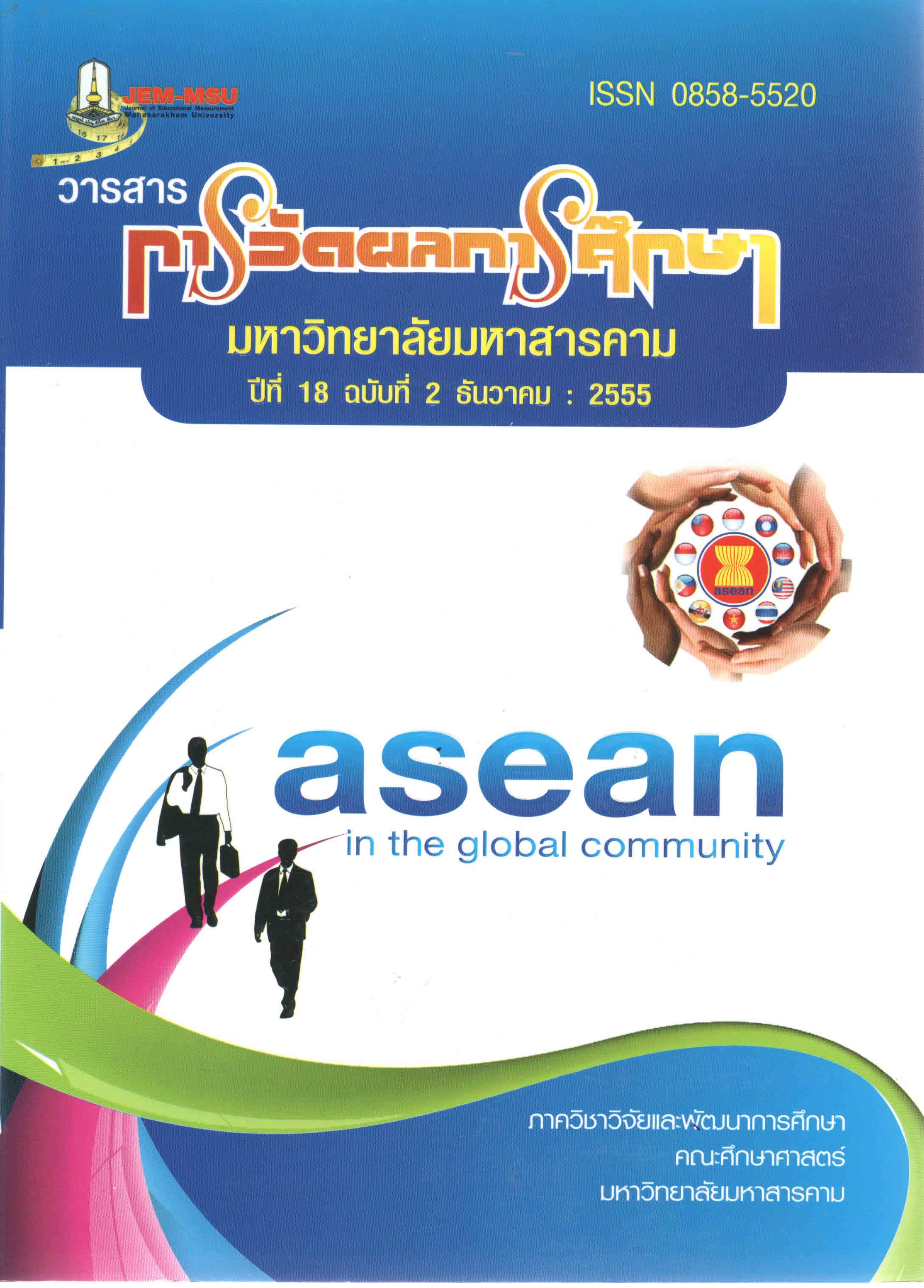Development of a Causal Model of Intelligence Quotient, Emotional Quotient, Moral Quotient, Adversity Quotient and Analytical Thinking Ability on Mathematics Learning Achievement of Prathomsueksa 6 Students Under The Office of Nongkhai Service Area Zone 1
Main Article Content
Abstract
Students’ mathematics achievement tells how successful mathematics study
is. If an activity planning is appropriate and useful, it will result in good achievement.
This research was aimed at: 1) develop a model and examine the goodness of fit of
the effects of intelligence quotient, emotional quotient, moral quotient, adversity
quotient and analytical thinking ability on mathematics learning achievement and
2) study the effects of intelligence quotient, emotional quotient, moral quotient,
adversity quotient and analytical thinking ability on mathematics learning achievement
of model to the empirical data. The research sample consisted of 750 Prathomsueksa
6 students in academic year 2011 from the school in The Office of Nongkhai Service
Area Zone 1 ; who were randomly selected by a multi-stage stratified random sampling
technique. The research instruments included a 30-item for intelligence quotient test
with the item difficulties ranging from .032 to .079, discrimination powers ranging from
0.23 to 0.85 and the reliability of 0.71 , a 30-item scale for emotional quotient with
discrimination powers ranging from 0.28 to 0.84 and the reliability of 0.95 , a 20-item
scale for moral quotient with discrimination powers ranging from 0.36 to 0.62 and the
reliability of 0.90 , a 20-item scale for adversity quotient with discrimination powers
ranging from 0.24 to 0.56 and the reliability of 0.85 , a 15-item for analytical thinking
ability test with the item difficulties ranging from .057 to .068, discrimination powers
ranging from 0.54 to 0.85 and the reliability of 0.84 and a 20-item for mathematics
learning achievement test with the item difficulties ranging from .047 to .081,
discrimination powers ranging from 0.23 to 0.77 and the reliability of 0.55. Data were
collected by a test and analyzed by a descriptive statistics, Pearson’s product moment
correlation and A structural equation modeling analysis.
The research findings were as follows :
1. The overview of the model of the effects of intelligence quotient,
emotional quotient, moral quotient, adversity quotient and analytical thinking
ability on mathematics learning achievement was fitted with the empirical data
having Chi-square goodness of fit test was 398.179, df = 206, p = 0.068, GFI = 0.977,
AGFI = 0.969 and RMSEA = 0.042 All variables in the model accounted for 78.7 %
of variance in students’ mathematics learning achievement.
2. According to the effects of intelligence quotient, emotional quotient,
moral quotient, adversity quotient and analytical thinking ability on mathematics
learning achievement as follows.
2.1 Moral quotient has a positive total effect to mathematics learning
achievement of 0.174 at the .01 level of significance and has a positive direct effect of
0.278 at the .01 level of significance.
2.2 Intelligence quotient has a positive total effect to mathematics
learning achievement of 0.659 at the .01 level of significance , has a positive direct
effect of 0.400 at the .01 level of significance and has a positive indirect effect
of 0.258 at the .01 level of significance.
2.3 Emotional quotient has a positive total effect to mathematics
learning achievement of 0.286 at the .01 level of significance and has a positive direct
effect to mathematics learning achievement of 0.289 at the .01 level of significance.
2.4 Adversity quotient has a positive total effect and has a positive
direct effect to mathematics learning achievement of 0.238 at the .01 level of
significance
2.5 Analytical thinking ability has a positive total effect and has
a positive direct effect to mathematics learning achievement of 0.603 at the .01 level
of significance
Article Details
The content and information contained in the published article in the Journal of Educational Measurement Mahasarakham University represent the opinions and responsibilities of the authors directly. The editorial board of the journal is not necessarily in agreement with or responsible for any of the content.
The articles, data, content, images, etc. that have been published in the Journal of Educational Measurement Mahasarakham University are copyrighted by the journal. If any individual or organization wishes to reproduce or perform any actions involving the entirety or any part of the content, they must obtain written permission from the Journal of Educational Measurement Mahasarakham University.


